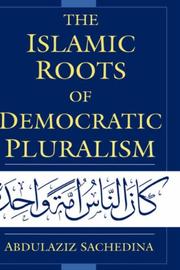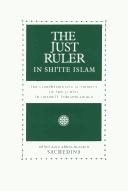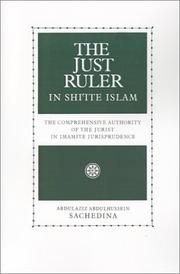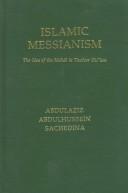| Listing 1 - 10 of 17 | << page >> |
Sort by
|

ISBN: 0195139917 0199848939 0195326016 0195349903 1280834897 9780195139914 9780195326017 Year: 2001 Publisher: Oxford Oxford University Press
Abstract | Keywords | Export | Availability | Bookmark
 Loading...
Loading...Choose an application
- Reference Manager
- EndNote
- RefWorks (Direct export to RefWorks)
Faith and reason --- Islam --- Rationalism. --- Religious pluralism --- Islam. --- Islam - 20th century. --- Religious pluralism - Islam. --- Religious pluralism - Islamic countries. --- Islam and reason.
Book
ISBN: 9780197581810 0197581811 Year: 2022 Publisher: New York, N.Y. Oxford University Press
Abstract | Keywords | Export | Availability | Bookmark
 Loading...
Loading...Choose an application
- Reference Manager
- EndNote
- RefWorks (Direct export to RefWorks)
Presenting an outline of the version of Islamic ethics that is embedded in the textual legacy of the Islamic legal tradition, Abdulaziz Sachedina argues that this juridical ethics is an important, even dominant form of ethics in modern Islam. He notes that this form of ethics has been challenged by modernity and examines the variety of ways in which legal ethical thinkers have reacted to these challenges.
PHILOSOPHY / Religious. --- General ethics --- Islam --- Islamic ethics
Book
ISBN: 0197581846 019758182X 0197581838 Year: 2022 Publisher: New York, NY : Oxford University Press
Abstract | Keywords | Export | Availability | Bookmark
 Loading...
Loading...Choose an application
- Reference Manager
- EndNote
- RefWorks (Direct export to RefWorks)
Islamic Ethics introduces the centrality of ethics as the most critical subject in directing the religious-social practice of the Muslim community. It introduces the field of ethics by reinvestigating the Islamic juridical heritage in the classical sources and their application in the contemporary Muslim societies. Until now, Islamic ethics has been studied as part of the philosophical discourse that has been greatly influenced by the Greek ethical tradition traced back to Aristotle. This study marks the departure from that Orientalist approach to uncover the path followed by Muslim legal scholars in the development of the juridical methodology to derive the Shari'a. The juridical methodology is deeply rooted in Islamic textual sources-the Qur'an and the Sunna (Tradition)-and the scholarly appraisal of these sources. Islamic texts are imbued with moral principles that have guided the religious-moral practice (the orthopraxy) in all its private and public facets to provide reliable practice for the organization of the community and its institutions. The important finding of the present study underscores the close working relationship between religious and secular in Islamic ethics, simply because of the integrated nature of God's rights and human rights in juridical theology. The study demonstrates the need to go beyond philosophical ethics to underscore the importance of ethics to the formulation of religious-moral procedures based on reason and revelation in Muslim interpretive jurisprudence.
Digital
ISBN: 9789048503957 Year: 2006 Publisher: Amsterdam Amsterdam University Press
Abstract | Keywords | Export | Availability | Bookmark
 Loading...
Loading...Choose an application
- Reference Manager
- EndNote
- RefWorks (Direct export to RefWorks)

ISBN: 019505363X Year: 1988 Publisher: New York : Oxford University Press,
Abstract | Keywords | Export | Availability | Bookmark
 Loading...
Loading...Choose an application
- Reference Manager
- EndNote
- RefWorks (Direct export to RefWorks)
Islam and state --- Temporal power of religious rulers --- Shi'ah --- Islam et Etat --- Pouvoir temporel des chefs religieux --- Chiisme --- Doctrines. --- Doctrines --- Islam and State. --- Shīʻah --- Temporal power of religious rulers.
Book
ISBN: 9780195378504 9780199860234 9780199702848 9786612053955 9780199888610 0195378504 Year: 2009 Publisher: Oxford Oxford university press
Abstract | Keywords | Export | Availability | Bookmark
 Loading...
Loading...Choose an application
- Reference Manager
- EndNote
- RefWorks (Direct export to RefWorks)
Biomedical ethics is a burgeoning academic field with complex and far-reaching consequences. Whereas in Western secular bioethics this subject falls within larger ethical theories and applications (utilitarianism, deontology, teleology, and the like), Islamic biomedical ethics has yet to find its natural academic home in Islamic studies. In this pioneering work, Abdulaziz Sachedina - a scholar with life-long academic training in Islamic law - relates classic Muslim religious values to the new ethical challenges that arise from medical research and practice. He depends on Muslim legal theory,
Medical ethics --- Bioethics --- Bioethical Issues --- Ethics, Medical --- Islam --- Religious aspects --- 297.15 --- Islam: ethiek; religieuze wetten --- Bioethical Issues. --- Ethics, Medical. --- Islam. --- 297.15 Islam: ethiek; religieuze wetten --- Biology --- Biomedical ethics --- Life sciences --- Life sciences ethics --- Science --- Clinical ethics --- Health care ethics --- Medical care --- Medicine --- Professional ethics --- Nursing ethics --- Social medicine --- Religious aspects&delete& --- Moral and ethical aspects --- Medical ethics - Religious aspects - Islam --- Bioethics - Religious aspects - Islam

ISBN: 0195353293 0585325480 9780585325484 0195119150 9780195119152 9786610471256 6610471258 019505363X 9780195053630 0197739822 9780195353297 Year: 1988 Publisher: New York : Oxford University Press,
Abstract | Keywords | Export | Availability | Bookmark
 Loading...
Loading...Choose an application
- Reference Manager
- EndNote
- RefWorks (Direct export to RefWorks)
Since the revolution of 1978-79, the Islamic regime has justified its rule on the basis of the doctrine of ""righteous jurist"". The author of this study shows this concept to have no parallel in Sunni Islam and seeks its origins in the Sunni/Shi'ite schism following the death of the Prophet.
Islam and state. --- Temporal power of religious rulers. --- Shīʻah --- Religious rulers, Temporal power of --- Kings and rulers --- Religion and state --- Sovereignty --- Theocracy --- Mosque and state --- State and Islam --- State, The --- Ummah (Islam) --- Shiites --- Doctrines. --- Doctrines --- Islam and politics. --- Sunnites --- Relations --- Shiites. --- Sunnites. --- Shīʻah.
Book
ISBN: 0585069247 9780585069241 1438418442 Year: 1981 Publisher: Albany State University of New York Press
Abstract | Keywords | Export | Availability | Bookmark
 Loading...
Loading...Choose an application
- Reference Manager
- EndNote
- RefWorks (Direct export to RefWorks)
Mahdism. --- Shīʻah --- Islam --- Religion --- Philosophy & Religion --- Islamic eschatology --- Mahdi --- Shiites --- Doctrines. --- Doctrines
Book
ISBN: 0199347174 9780199347179 Year: 2014 Publisher: New York (N.Y.): Oxford university press,
Abstract | Keywords | Export | Availability | Bookmark
 Loading...
Loading...Choose an application
- Reference Manager
- EndNote
- RefWorks (Direct export to RefWorks)

ISBN: 0873954580 Year: 1981 Publisher: Albany State university of New York press
Abstract | Keywords | Export | Availability | Bookmark
| Listing 1 - 10 of 17 | << page >> |
Sort by
|

 Search
Search Feedback
Feedback About UniCat
About UniCat  Help
Help News
News